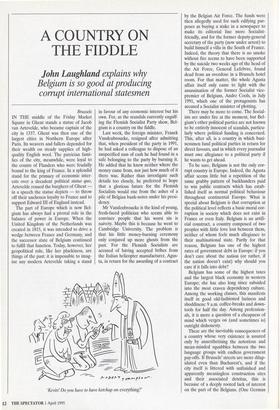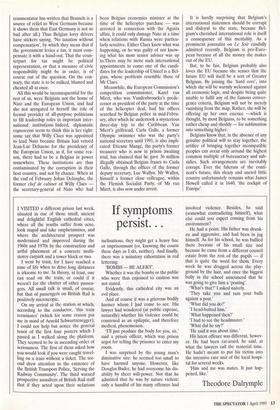A COUNTRY ON
THE FIDDLE
John Laughland explains why
Belgium is so good at producing corrupt international statesmen
The part of Europe which is now Bel- gium has always had a pivotal role in the balance of power in Europe. When the United Kingdom of the Netherlands was created in 1815, it was intended to drive a wedge between France and Germany, and the successor state of Belgium continued to fulfil that function. Today, however, her geopolitical role, like her pluckiness, are things of the past: it is impossible to imag- ine any modern Artevelde taking a stand in favour of any economic interest but his own. For, as the scandals currently engulf- ing the Flemish Socialist Party show, Bel- gium is a country on the fiddle.
Last week, the foreign minister, Franck Vandenbroucke, resigned after admitting that, when president of the party in 1991, he had asked a colleague to dispose of an unspecified sum of cash he had found in a safe belonging to the party by burning it. He added that he knew neither where the money came from, nor just how much of it there was. Rather than investigate such details too closely, he preferred to hope that a glorious future for the Flemish Socialists would rise from the ashes of a pile of Belgian bank-notes under his presi- dency.
Mr Vandenbroucke is the kind of young, fresh-faced politician who seems able to convince people that his worst sin is naivety. Maybe this is because he went to Cambridge University. The problem is that his little money-burning ceremony only conjured up more ghosts from the past. For the Flemish Socialists are accused of having accepted bribes from the Italian helicopter manufacturer, Agus- ta, in return for the awarding of a contract `Kevin! Do you have to have ketchup on everything?' by the Belgian Air Force. The funds were then allegedly used for such edifying pur- poses as buying a stake in a newspaper to make its editorial line more Socialist- friendly, and for the former deputy-general secretary of the party (now under arrest) to build himself a villa in the South of France. Indeed, the theory that there is no smoke without fire seems to have been supported by the suicide two weeks ago of the head of the Air Force, General Lefebvre, found dead from an overdose in a Brussels hotel room. For that matter, the whole Agusta affair itself only came to light with the assassination of the former Socialist vice- premier of Belgium, Andre Cools, in July 1991, which one of the protagonists has accused a Socialist minister of plotting.
There may be more to come. The Social- ists are under fire at the moment, but Bel- gium's other political parties are not known to be entirely innocent of scandals, particu- larly where political funding is concerned. This, after all, is a country in which busi- nessmen fund political parties in return for direct favours, and in which every journalist must owe allegiance to a political party if he wants to get ahead.
To be sure, Belgium is not the only cor- rupt country in Europe. Indeed, the Agusta affair seems little but a repetition of the same grubby pattern of backhanders paid to win public contracts which has estab- lished itself as normal political behaviour throughout continental Europe. What is special about Belgium is that corruption at the political level reflects a basic moral cor- ruption in society which does not exist in France or even Italy. Belgium is an artifi- cial construct, a country composed of two peoples with little love lost between them, neither of whom feels much allegiance to their multinational state. Partly for that reason, Belgium has one of the highest rates of government debt in Europe: if you don't care about the nation (or rather, if the nation doesn't exist) why should you care if it falls into debt?
Belgium has some of the highest taxes and the largest black economy in western Europe; she has also long since subsided into the most craven dependency culture. Among the working classes, this manifests itself in good old-fashioned laziness and shoddiness: 9 a.m. coffee-breaks and down- tools for half the day. Among profession- als, it is more a question of a cheapness of mind which verges on (and sometimes is) outright dishonesty.
These are the inevitable consequences of a country whose very existence is assured only by anaesthetising the notorious and mean-minded squabbles between the two language groups with endless government pay-offs. If Brussels' streets are more dilap- idated even than Bucharest's, and if the city itself is littered with unfinished and apparently meaningless construction sites and their associated detritus, this is because of a deeply rooted lack of interest on the part of the Belgians. (One German commentator has written that Brussels is a source of relief to West Germans because it shows them that East Germany is not so bad after all.) Thus Belgian lorry drivers have stickers saying, 'No taxation without compensation', by which they mean that if the government levies a tax, it must com- pensate it with a hand-out. That the coun- terpart for tax might be political representation, or that a measure of civic responsibility might be in order, is of course out of the question. On the con- trary, the state is to be milked, blamed and cheated all at once.
All this would be inconsequential for the rest of us, were Belgium not the home of Nato and the European Union, and had she not arrogated to herself the role of fecund provider of all-purpose politicians to fill leadership roles in important inter- national institutions. Indeed, diplomatic cognoscenti seem to think this is her right: some say that Willy Claes was appointed to lead Nato because Britain had vetoed Jean-Luc Dehaene for the presidency of the European Union, as if, for some rea- son, there had to be a Belgian in power somewhere. These institutions are thus contaminated by the corruption in their host country, and not by chance. When at the end of February Johan Delanghe, the former chef de cabinet of Willy Claes the secretary-general of Nato who had been Belgian economics minister at the time of the helicopter purchase — was arrested in connection with the Agusta affair, it could only damage Nato at a time when relations with Russia were particu- larly sensitive. Either Claes knew what was happening, or he was guilty of not know- ing what his most senior adviser was up to.There may be more such international appointments to come: one of the candi- dates for the leadership of Unicef is a Bel- gian, whose problems resemble those of Mr Claes.
Meanwhile, the European Commission's competition commissioner, Karel van Miert, who was Vandenbroucke's prede- cessor as president of the party at the time of the helicopter deal, had his offices searched by Belgian police in mid-Febru- ary, after which he undertook a mysterious three-day trip to the Caribbean. Van Miert's girlfriend, Carla Galle, a former Olympic swimmer who was the party's national secretary until 1991, is also impli- cated: Etienne Mange, the party's former treasurer who is now in prison awaiting trial, has claimed that he gave 36 million illegally obtained Belgian francs to Carla Galle, through the offices of the former deputy secretary, Luc Wallyn. Mr Wallyn, himself a former close colleague, within the Flemish Socialist Party, of Mr van Miert, is also now under arrest. It is hardly surprising that Belgium's international statesmen should be corrupt and disloyal to the state, because Bel- gium's cherished international role is itself a consequence of this mentality. As a prominent journalist on Le Soir candidly admitted recently, Belgium is pro-Euro- pean because of all the money she makes out of the EU.
But, to be fair, Belgium probably also loves the EU because she senses that the future EU will itself be a sort of Greater Belgium. By joining the 'hard core', into which she will be warmly welcomed against all economic logic, and despite being quite unable to fulfil any of the famous conver- gence criteria, Belgium will not be merely vanishing from the map. Rather, she will be offering up her own essence —which is thought, by most Belgians, to be something rather cheap and shoddy — for sublimation into something higher.
Belgians -know.that, in the absence of any genuine political will to stay together, the artifice of bringing together incompatible peoples can occur only around the highest common multiple of bureaucracy and sub- sidies. Such arrangements are inevitably corrupt. Ever the fulcrum of the conti- nent's future, this sleazy and uncivil little country unfortunately remains what James Howell called it in 1640, 'the cockpit of Europe'.



























































 Previous page
Previous page